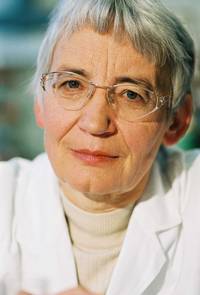


From inorganic scientist to biotechnologist: As director of the Institute for Enzyme Technology at the University of Düsseldorf, Maria-Regina Kula worked on biocatalysts. In 2002 she received the German Future Prize for her findings.
Maria-Regina Kula was born in Berlin in March 1937. After graduating from high school, she first studied chemistry at the Berlin Humboldt University and then at the Ludwig Maximilians University in Munich (LMU). She also completed her doctoral thesis at LMU in 1962. In the working group of Egon Wiberg (1901-1976) and Eberhard Amberger (1926-1995) she had mainly dealt with hydrides and double hydrides. Wiberg, the well-known co-author of the standard work "Textbook of Inorganic Chemistry", was her doctoral supervisor.
After completing her dissertation, Maria-Regina Kula initially stayed at the Institute for Inorganic Chemistry at LMU. She then stayed from 1964 to 1967 as a scholarship holder of the German Research Foundation at the Johns Hopkins University School of Medicine in Baltimore, Maryland. Since her focus of interest had shifted from inorganic chemistry to the biosciences, she found a job as a research assistant at the Max Planck Institute for Experimental medicine in Göttingen after working in the USA. In 1969 she moved to the Society for Molecular Biological Research in Braunschweig as department head, from which the Society for Biotechnological Research emerged in 1976 and the Helmholtz Center for Infection Research (HZI) in 2006. Kula shaped the institution from 1975 to 1979 as scientific director and worked there as a department head until 1985.
In 1979 Maria-Regina Kula completed her habilitation in biochemistry at the TU Braunschweig. From 1986 to 2002 she was professor and director of the Institute for Enzyme Technology at Heinrich Heine University in Düsseldorf, which is located on the premises of the Jülich Research Center. Her collaboration with biotechnology professors Christian Wandrey (born 1943) and Hermann Sahm (born 1942) was particularly fruitful during this time.
Prof. Kula was particularly fascinated by the catalytic properties of enzymes. She wanted to bring them into the chemical industry as catalysts and therefore began to look at methods for isolating intracellular enzymes on a larger scale at an early stage. Their knowledge in this area received relatively little attention in Germany, but became more and more important with the advances in biotechnology and genetic engineering. In America, Maria-Regina Kula made a name for herself with it, while in Germany she is better known for other achievements, including the development of an enzyme membrane reactor.
For ten years she was co-editor for downstream processing at Biotechnology & Bioengineering, the leading journal in biotechnology. For decades she has also co-organized the international Conference ?Recovery of Biological Products?. Maria-Regina Kula has received several awards for her scientific findings. She was elected a foreign member of the American National Academy of Engineering and received an honorary doctorate from Lund University. For her work on enzyme membrane reactors, the professor received the 1983 Technology Transfer Prize from the Federal Ministry for Research and Technology. In this area she cooperated with the Degussa company. The aim was the industrial production of L-amino acids, especially L-methionine. She has been a member of the North Rhine-Westphalian Academy of Sciences since March 1995 and in 1997 she was awarded the Federal Cross of Merit, 1st class.
As the culmination of her scientific Career , she and the chemist and biotechnologist Martina Pohl (born 1961) received the German Future Prize for her research on gentle chemistry with biocatalysts at the end of 2002. At the beginning of the same year, in March 2002, Maria-Regina Kula retired. She has been a member of the GDCh since 1965 and now lives in Munich.
a notice
The texts published in this series do not claim to be scientific publications. Authors and other people involved are not experts in the history of science. The purpose of the series is to introduce the mostly unknown women chemists and to remind you of the well-known women chemists. We encourage readers who want to know more to study academic Literature on the women featured. In some cases there are detailed chemical-historical works.
authors
Prof. Dr. Eberhard Ehlers
Prof. Dr. Heribert Offermanns
Editorial processing
Dr Uta Neubauer
project management
Dr Karin J. Schmitz (GDCh public relations)
The authors are responsible for the content of the biographies.
The content presented on these pages has been carefully compiled. However, the authors, Editorial staff and publishers assume no responsibility or liability for the completeness and correctness of the content or for typographical errors.
Photo: German Future Prize / Ansgar Pudenz
back to publications
back to the biographies of women chemists
This page has been machine translated. If you have any feedback or comments please feel free to contact us. 
last modified: 16.07.2021 13:29 H from M.Fries